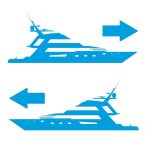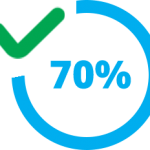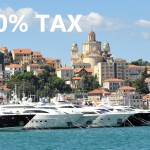
Please find below a news about the VAT regime in Spain on supplies of goods to commercial yachts, released by our Spanish referent Mr. Alex Chumillas:
Most commercial yachts based in Spanish marinas are owned by European companies, which in many cases are registered for VAT purposes in their respective countries. It is very often that local Spanish suppliers and clients end up in a conflict situation over whether the goods supplied to these yachts should be subject to Spanish VAT or not. We will try to provide here an overview of the Spanish approach to this situation.
First of all, we must remind that the term “intra-Community supply” refers to goods supplied by a business in one EU Member State to a business located in another EU Member State where the goods have been transported from the territory of one Member State to another as the result of such supply.
A VAT-registered trader in one State may apply the zero rate to the supply of goods to a business customer in another Member State if:
a. the customer is registered for VAT in another Member State
b. the customer’s VAT registration number is obtained and kept in the supplier’s records
c. this number, together with the supplier’s VAT registration number, is stated on the sales invoice, and
d. the goods are dispatched or transported to another Member State
So what is the Spanish approach on this matter and more specifically on supplies to commercial yachts?
Several recent rulings issued by the Spanish Directorate of Taxes determine the current trend and approach in Spain. Among these rulings, the following deserve special attention:
1. Binding ruling dated October 2015 which considered that the supply of spare parts to transport trucks owned by VAT registered business in other member states would be subject to Spanish VAT when the supply of such parts takes place in Spain.
2. Binding ruling dated February 2016 which considered that the supply of equipment to commercial yachts owned by VAT registered entities in other member states, when the supply of goods involves an installation or assembly of the equipment by the Spanish local supplier and such installation takes place in Spanish territory, the whole supply is subject to Spanish VAT.
In addition, a couple of court judgments are relevant to this matter:
3. Judgment STS 2978/2012 of the Spanish Supreme Court of Justice which consider that, in order to consider a supply of goods as an intra-community supply, the document declaring receipt of the goods by the acquirer must clearly state that the goods were actually delivered outside Spanish territory by means of a declaration or certification of the goods’ recipient.
4. Finally we consider that the ECJ Facet case is relevant, according to which intra-Community supply would imply that the associated intra-Community acquisition should be deemed to have been made in the Member State which issued the identification number. In other words the goods should have been actually delivered to the Member State where the customer is identified for VAT purposes.
The above resolutions determine the current jurisprudential trend in Spain. The intention to remove the goods from Spanish territory is not enough, but an effective shipping or exit of the goods from the Spanish territory at the time the supply takes place in Spain. Therefore, if this condition is not met instantaneously at the time the supply becomes effective, the whole supply should be subject to Spanish VAT.
For further information, please email our Spanish referent Mr. Alex Chumillas to alex@taxmarine.com or send your inquiry to info@yachtwelfare.it. We are always pleased to assist you and remain at your disposal.



